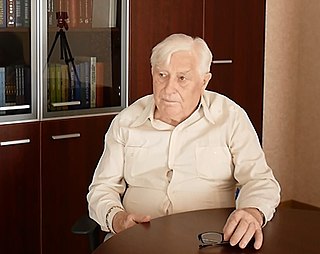 |
|---|
The president of the Socio-Political Chamber was the presiding officer of the Socio-Political Chamber of the Federal Assembly of Yugoslavia.
 |
|---|
The president of the Socio-Political Chamber was the presiding officer of the Socio-Political Chamber of the Federal Assembly of Yugoslavia.

In sociology, the ruling class of a society is the social class who set and decide the political and economic agenda of society. In Marxist philosophy, the ruling class are the capitalist social class who own the means of production and by extension determine and establish the dominant ideology of society by way of cultural hegemony. In the 21st century, the worldwide political economy established by globalization has created a transnational capitalist class that is not native to any one country.

The Authentic Radical Liberal Party is a centrist liberal political party in Paraguay. The party is a full member of Liberal International. The liberales, as they are known, are the leading opposition to the dominant conservative Colorado Party. They have taken this position since the end of the Alfredo Stroessner dictatorship in 1989. They are the political successors of the Liberal Party, which traces its history back to 10 July 1887.

Al-Wefaq National Islamic Society, sometimes shortened to simply Al-Wefaq, was a Shi'a Bahraini political party, that operates clandestinely after being ordered by the highest court in Bahrain to be dissolved and liquidated. Although from 2006 to 2011 it was by far the single largest party in the Bahraini legislature, with 18 representatives in the 40-member Bahraini parliament, it was often outvoted by coalition blocs of opposition Sunni parties and independent MPs reflecting gerrymandering of electoral districts. On 27 February 2011, the 18 Al-Wefaq members of parliament submitted letters of resignation to protest regime violence against pro-reform Bahraini protestors.

The Rally of Progressive National Democrats is a political party in Haiti.
Institutional discrimination is discriminatory treatment of an individual or group of individuals by society or institutions, through unequal consideration of members of subordinate groups. These unfair and indirect methods of discrimination are often embedded in an institution's policies, procedures, laws, and objectives. The discrimination can be on grounds of gender, caste, race, ethnicity, religion, or socio-economic status.

Aleksandr Semenovich Kapto was a Russian and Ukrainian sociologist, political scientist and a diplomat, journalist and politician. He earned a philosophy degree in 1967 and his Ph.D. in 1985. In 2008 he was head of the UNESCO International Board of the Institute of Socio-Political Research under the Russian Academy of Sciences (RAS).

The Parliament of Yugoslavia was the legislature of Yugoslavia. Before World War II in the Kingdom of Yugoslavia it was known as the National Assembly, while in the Socialist Federal Republic of Yugoslavia the name was changed to Federal Assembly. It functioned from 1920 to 1992 and resided in the building which now convenes the National Assembly of Serbia.
David Hughes was a British novelist. His best known works included The Pork Butcher for which he was awarded the WH Smith Literary Award in 1985 and But for Bunter, published as The Joke of the Century in the United States.

Ludvik Toplak is a Slovenian law professor and academic administrator, and former politician, ambassador, and member of the Parliament. He is vice-president of the Alma Mater Europaea and former rector of the University of Maribor. He is a member of the European Academy of Sciences and Arts.

Maxim Shevchenko is an editor, journalist and presenter on television and radio in Russia, one of the leading Russian journalists and experts on ethno-cultural and religious policies. He is the leader of the opposition Russian Party of Freedom and Justice.
The 1963 Yugoslav Constitution was the second constitution of the Socialist Federal Republic of Yugoslavia. It came into effect on April 7, 1963. The constitution was the result of beliefs of the governing structures that Yugoslav self-management relations have been sufficiently overcome in the society that it deserved a new and final constitutional definition and enthroning.

The 1974 Yugoslav Constitution was the fourth and final constitution of the Socialist Federal Republic of Yugoslavia. It came into effect on 21 February 1974.

Parliamentary elections were held in Yugoslavia between 16 March and 10 May 1974 through a complicated delegate system which selected delegates to local, republic, and federal assemblies.

Parliamentary elections were held in Yugoslavia between 10 March and 10 May 1978 through a complicated delegate system which selected delegates to local, republic, and federal assemblies.
Joseph-Georges Kasongo was a Tanganyikan-born Congolese lawyer, businessman, and politician who served as the first President of the Chamber of Deputies of the Republic of the Congo. He later held office as a deputy prime minister and as a senator.

Gaspard Cyimana was a Rwandan statesman, industrialist, economist, and leader of independence who served as the 1st Minister of Finance of Rwanda. Cyimana was one of the Founding Fathers of the Republic of Rwanda, signing the original 1961 Constitution of Rwanda and the subsequent 1962 Constitution of Rwanda. He was a top leader of Rwandan independence from Belgium. Cyimana was a leader of Hutu-Tutsi reconciliation, arguing for the necessity of a multi-ethnic society for Rwanda to be prosperous and economically feasible, and was a signer of the 1960 Entente Between the Tutsi-Hutu Youth of Rwanda. He served as the 1st Minister of Finance, Economic Affairs and Planning of Rwanda from 1960–1968.
Parliamentary elections were held in Yugoslavia between 10 March and 10 May 1982 through a complicated delegate system which selected delegates to local, republic, and federal assemblies.
Parliamentary elections were held in Yugoslavia between 10 March and 10 May 1986 through a complicated delegate system which selected delegates to local, republic, and federal assemblies.